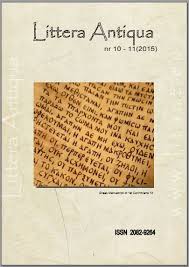Ancient Greek literary and philosophical tradition in Kostas Varnalis’ The True Apology of Socrates and The Diary of Penelope
Ancient Greek literary and philosophical tradition in Kostas Varnalis’ The True Apology of Socrates and The Diary of Penelope
Author(s): Christina-Panagiota ManoleaSubject(s): Literary Texts, Cultural history, Studies of Literature, Ancient World
Published by: Katolicki Uniwersytet Lubelski Jana Pawła II - Instytut Filologii Klasycznej
Keywords: Kostas Varnalis; Reception; Homeric tradition; Socrates; Modern Greek Prose; Ancient Greek Literary Tradition; Ancient Greek Philosophical Tradition
Summary/Abstract: This article examines the reception of ancient Greek literary and philosophical tradition by Kostas Varnalis (1883-1974), as exposed in his works The True Apology of Socrates (1933) and The Diary of Penelope (1946). Both works show Varnalis’ talent in prose. But they also show, each one in its own style, how Varnalis exploited two exceptional figures of ancient Greek literary tradition. Varnalis exploited a philosopher as well as a Homeric heroine, in his effort to write satire and to propose a revolutionary perspective to his potential readers. The True Apology of Socrates is definitely influenced by Varnalis’ Marxist views. Varnalis’ Socrates bears some similarities with the ancient figure, as exposed in the works of Plato and Xenophon. Yet, despite his familiarity with the ancient tradition, Varnalis created a figure of his own that attacked and totally rejected the bourgeois way of life and thought. Varnalis recreated tradition in a way fitting his own needs. In The Diary of Penelope Varnalis rejected the traditional Homeric image of the loving and faithful Odysseus’ wife. In this work satire is used for once more in order to criticize bitterly the hypocrisy of bourgeois society. Varnalis’ Penelope has a totally different life and deeds form the Homeric heroine. She does not wait for her husband’s return in situation of chastity, as Varnalis presents her having sexual relationships with literally all the suitors. She is also a heartless, ruthless governor. But even in such an innovative and iconoclastic situation, Varnalis’ Penelope preserves two basic characteristics of the Homeric heroine: intelligence and cunningness. Varnalis succeeded in creating a multi-sided heroine as well as an important work, where the ancient Greek literary tradition at the end meets history and is widely exploited in a rather challenging way.
Journal: Littera Antiqua
- Issue Year: 2016
- Issue No: 11
- Page Range: 60-90
- Page Count: 31
- Language: English

